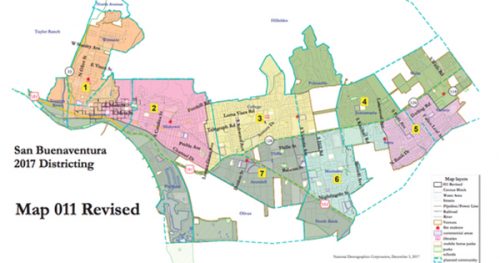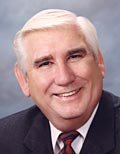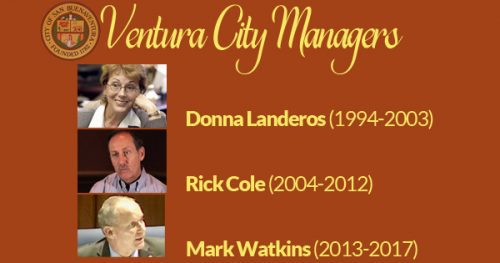Is Leadership Scarce In Ventura? The Censure Farce Suggests Yes
The Move To Censure Turns To Tragedy
VREG has been silent for six months. City Hall decisions have been hard to reconcile and easy to criticize, so we have held off joining in on the fray. It is difficult not to write about what has been happening with our City government, but as we explain below it has all the makings of a modern Shakespearean tragedy.
New City Council
In December 2022, voters elected three new City Council Members, Jim Duran, Liz Campos and Bill McReynolds. We will reserve the temptation to comment on their talents or lack thereof. Still with these three joining the other four (voters elected Jeannette Sanchez-Palacios after she was appointed to fill a prior vacancy, Joe Schroder, Mike Johnson and Doug Halter), the longest tenure of any of them is just over two years.
The historical knowledge of this group is limited to their personal experience, with little regard for past governmental actions. Some declare a ‘lifelong’ familiarity with ‘all things Ventura,’ but overseeing city politics from an elected city council perspective is far different from being a citizen. The most significant gap is understanding the difference between being in a ‘board of director role,’ as an elected council member, versus being a ‘department head, manager or even a CEO of a company.’ The first lesson they need to learn and accept is that the city council only hires two people for advice on the everyday management of our city, the City Manager and the City Attorney.
As City Councilmembers, they are not HR directors and do not micro-manage staff, city departments or budgets. The role of a council member is to set policy, direct procedures and, in some cases, make laws when necessary.
Councilmembers Unclear On Roles
 The greatest surprise is that the staff does not work for the City Council. Councilmembers must understand that the staff answers to their supervisors and, as is human nature, will not jeopardize their position, supervisor or job if it is avoidable. And, to make matters worse, the staff may have budgets and goals contradictory to the public and the elected officials.
The greatest surprise is that the staff does not work for the City Council. Councilmembers must understand that the staff answers to their supervisors and, as is human nature, will not jeopardize their position, supervisor or job if it is avoidable. And, to make matters worse, the staff may have budgets and goals contradictory to the public and the elected officials.
The staff can access details and information the City Council needs to make decisions or set policies. Yet, the staff is not the only source of information available to the City Council. Our elected officials must be truthful and ask tough questions about budgets, expenses, staffing, project deadlines, and other options before making decisions. No staff member has ever told the Council, ’We can cut our budget and staff and provide better efficiency with less.’ Again, the role of a Councilmember is to set policy, direct procedures and, in some cases, make laws. The Council cannot do that properly without being provided with all the options unbiasedly.
This concept of questioning or challenging staff information has led to dysfunction at City Hall for the last six months.
By observation, the City of Ventura is a wasteland regarding leadership. Recent Councilmembers have needed to be more experienced in their leadership roles. There has not been a permanent City Manager for over six months. During that time, several department heads were placed on leave or terminated. Most recently, there has also been an attempt to censure an elected Councilmember. All this while the new Mayor says that the city is in great shape with a ‘deep bench’ of staff, and another Councilmember says this is the best group of Councilmembers ever.
To Censure or Admonish Another Council Member?
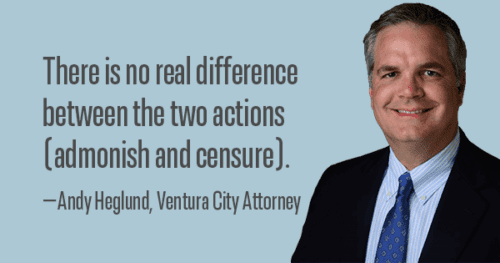
Censure was the question before the City Council during a 5-hour special meeting. Notably, the City Attorney, who makes a living defining words, told the Ventura County Star there was no real difference between these two actions.
We beg to differ and refer to Mr. Webster. To admonish is ‘to warn or reprimand someone firmly’ while censure is ‘to express severe disapproval, typically in a formal statement.’ Without taking sides in this debate, it finally came down to a Council member using the wrong ‘tone’ with a staff member in an effort to obtain the information he wanted to do his job as an elected official for the benefit of the community.
When we asked some individual Council Members about the outcome of the meeting, one expressed that they wanted to take away the specific committee assignments for which the accused Councilmember received a ‘meeting stipend.’ This reply sounds purely punitive and more like retribution. The investigation may have been an indictment of something wrong, but it was never a legal judgment and certainly not conclusive of any wrongdoing. Judging their peers is not the role of a Councilmember. All seven need training in what their roles are.
Plenty of Blame to Go Around
 We do not need the details of the HR complaint to comment on the actions of the Councilmembers. We know that the Mayor, City Attorney and City Manager (interim) were present and either did not witness or did not see fit to deal with the purported infraction when it occurred. Even the current City Councilmembers, in a very diplomatic way, did not see fit to question, deflect or detour the questionable ‘exchange.’ The Council and staff focused on the complaint and Mr. Johnson, but somehow there was no further discussion about the fact that eight other members on the dais were present when the ‘offense’ allegedly occurred. Instead, this becomes a 5-hour discussion that looks more like a ‘gang attack’ on one council member. We make no excuses for what may or may not have occurred. Yet, if something did happen, everyone present needs to share in the guilt.
We do not need the details of the HR complaint to comment on the actions of the Councilmembers. We know that the Mayor, City Attorney and City Manager (interim) were present and either did not witness or did not see fit to deal with the purported infraction when it occurred. Even the current City Councilmembers, in a very diplomatic way, did not see fit to question, deflect or detour the questionable ‘exchange.’ The Council and staff focused on the complaint and Mr. Johnson, but somehow there was no further discussion about the fact that eight other members on the dais were present when the ‘offense’ allegedly occurred. Instead, this becomes a 5-hour discussion that looks more like a ‘gang attack’ on one council member. We make no excuses for what may or may not have occurred. Yet, if something did happen, everyone present needs to share in the guilt.
Making the situation even more absurd was the City Attorney’s unilateral decision to hire an outside law firm for $75,000 to investigate the impropriety of one of his bosses.
Waiting for the Next Shoe to Drop
During the 5-hour discussion about censoring or admonishing Council Member Johnson, some members stood on three moral high ground standards:
- ‘Zero tolerance’ for bullying.
- Elected officials should hold themselves to a ‘higher standard’ of conduct than the ordinary citizen.
- Even the ‘perception’ of disrespecting a staff member was severe enough to take action.
At this point, Councilmember, Liz Campos, stated publicly that her fellow Councilmembers disrespected and belittled her (2:25:08 to 2:28:28) in a closed session, with both the interim City Manager and City Attorney present.
Surprisingly, nobody commented on this statement. When will this investigation begin? Will the City Attorney contract another outside law firm to investigate Ms. Campos’ claims, and what will that cost the citizens?
And, given the three moral high ground standards set forth earlier in the meeting, there should have been four resignations from the four Councilmembers claiming that higher ground. Yet, there weren’t. If those four Councilmembers are to be true to their beliefs and to not be hypocritical, we expect four resignations when the investigation begins.
Editors Comments

We, as citizens, should be disappointed and embarrassed. The Shakespearean quote above is apropos. It means goodness is bad, and badness is good.
Councilmembers and staff need to stop patting each other on the back for doing a good job when it is their job to perform their work and fulfill their assignments and quietly accept that a Councilmember might be verbally critical if they do not do their job.
What should the citizens of Ventura be entitled to expect? Hire a City Manager to manage our affairs and help the Council through decision-making. As for the City Attorney, he will always warn that the city can be ‘sued,’ but the possibility of a lawsuit cannot be the overriding reason for the Council to vote a certain way. The City Attorney’s job is to “advise” and help on legal matters. A City Manager’s job is to help the council stay focused on their roles and priorities.
City Council’s priorities are budgets and safety. It is not to accept all staff reports and recommendations at face value. City Council’s job is to question, challenge and determine the best use of the citizens’ money. It is not to be the cheerleader to all staff members or to accept every report and recommendation staff presents. The City Council is the last safeguard to protect the citizens against wasteful spending. Nobody recalls a time when the staff has reduced their budget or lowered their personnel count. While asking questions, one person’s inquiry may appear to be another person’s assertiveness or aggression. Answering Council’s questions is a large part of the staff’s job.
While other communities are trying to address housing, traffic, economic issues and crime, Ventura is squabbling and spending time pointing fingers and punishing each other.
You don’t like our tone? Is the message too harsh? Too bad. Get over it.
Tell The City Council To Focus On Their Job
Below you’ll find the photos of our current City Council. Click on any Councilmember’s photo and you’re email program will ready to write directly to that Councilmember.
Let them know what you’re thinking. Tell them what they’re doing right and what they could improve upon. No matter what you write, however, share your opinion. Participating in government makes things better because our city government is working for all of us.
 |
 |
|
 |
 |
|
 |
 |
|
 |
For more information like this, subscribe to our newsletter, Res Publica. Click here to enter your name and email address.

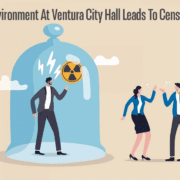
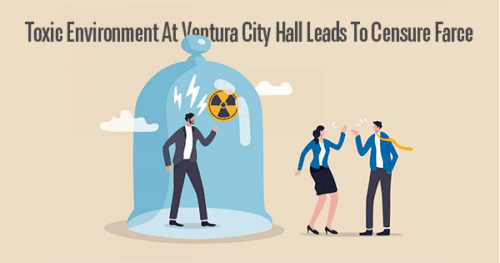

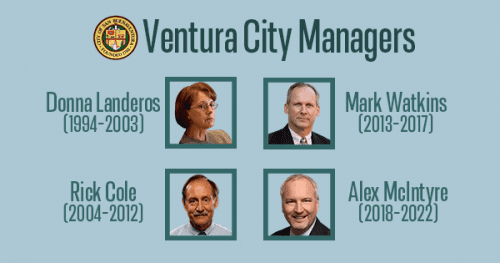
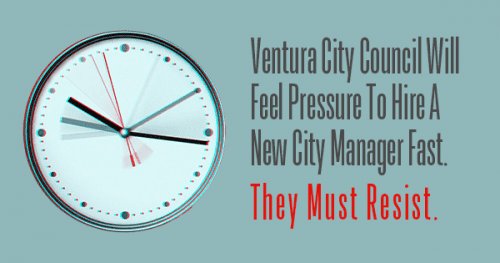





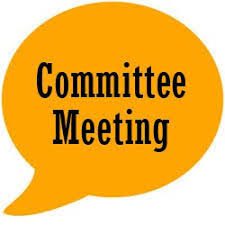 The Council has proposed some significant changes. They include:
The Council has proposed some significant changes. They include: Every Planning Commissioner would be accountable to the Councilmember who appointed him or her.
Every Planning Commissioner would be accountable to the Councilmember who appointed him or her. The proposed changes don’t please everyone. The immediate resistance came from some existing committee members and commissioners. There are two main objections. Some complained about the process. Others believe there will be less transparency and citizen involvement.
The proposed changes don’t please everyone. The immediate resistance came from some existing committee members and commissioners. There are two main objections. Some complained about the process. Others believe there will be less transparency and citizen involvement.









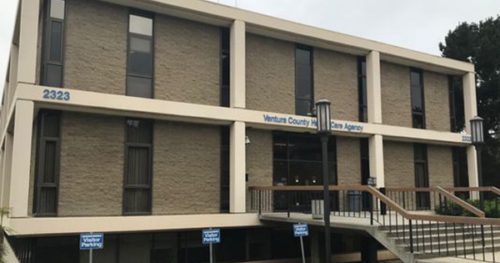 Topping the mayor’s list of priorities was opening a permanent, full-service homeless shelter by December 31, 2019. The date gives this goal specificity. Opening the center doesn’t begin to solve the problem, though. Mayor LaVere and the City Council equate opening a homeless center with improving Ventura’s homeless situation. They are not the same thing.
Topping the mayor’s list of priorities was opening a permanent, full-service homeless shelter by December 31, 2019. The date gives this goal specificity. Opening the center doesn’t begin to solve the problem, though. Mayor LaVere and the City Council equate opening a homeless center with improving Ventura’s homeless situation. They are not the same thing. What’s more, the City Council conflates opening the center with helping the homeless. The goal shouldn’t be to have beds available. That’s an intermediary step. The goal should be to get the homeless off the street and return them to a healthy way of life.
What’s more, the City Council conflates opening the center with helping the homeless. The goal shouldn’t be to have beds available. That’s an intermediary step. The goal should be to get the homeless off the street and return them to a healthy way of life.
 Mayor LaVere’s fourth goal is to beautify the community. He wants to end what he termed “blight.”
Mayor LaVere’s fourth goal is to beautify the community. He wants to end what he termed “blight.” The mayor hopes to achieve this goal by building community parks. The Westside Community Park set the model. Mayor LaVere’s first target is Mission Park.
The mayor hopes to achieve this goal by building community parks. The Westside Community Park set the model. Mayor LaVere’s first target is Mission Park. Mission Park is home to a growing number of Ventura’s homeless population. To prepare the area, the homeless must move elsewhere. The 55-bed homeless shelter isn’t the solution. Also, even if we scatter the homeless, there are safety issues. Someone would have to clean the discarded needles, drug paraphernalia and human waste from the park.
Mission Park is home to a growing number of Ventura’s homeless population. To prepare the area, the homeless must move elsewhere. The 55-bed homeless shelter isn’t the solution. Also, even if we scatter the homeless, there are safety issues. Someone would have to clean the discarded needles, drug paraphernalia and human waste from the park.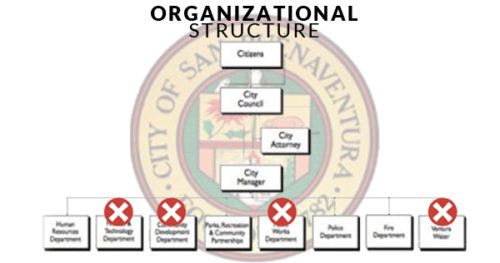 The need for key personnel is a huge problem. To fulfill any of our mayor’s goals requires adequate staff. The final 2019-2020 goal is to stabilize and strengthen our city government. The city has eight unfilled, critical managerial positions and dozens of vacant jobs. The city will achieve none of the other ambitious goals if there aren’t enough workers at City Hall.
The need for key personnel is a huge problem. To fulfill any of our mayor’s goals requires adequate staff. The final 2019-2020 goal is to stabilize and strengthen our city government. The city has eight unfilled, critical managerial positions and dozens of vacant jobs. The city will achieve none of the other ambitious goals if there aren’t enough workers at City Hall.



 Costing over $500,000,000 is not the only issue. The more significant issue is that the City Council assumed DPR water was safe to drink.
Costing over $500,000,000 is not the only issue. The more significant issue is that the City Council assumed DPR water was safe to drink.  However, the Consent Decree says the court can extend the time limit in the event of construction constraints, financing problems, or an emergency. It requires Ventura to petition the court requesting an extension, or an agreement with the plaintiff and their lawyers. That has not happened.
However, the Consent Decree says the court can extend the time limit in the event of construction constraints, financing problems, or an emergency. It requires Ventura to petition the court requesting an extension, or an agreement with the plaintiff and their lawyers. That has not happened. On February 4, 2019, Council Member Jim Friedman asked our City Attorney, Gregory Diaz about extending the deadline.
On February 4, 2019, Council Member Jim Friedman asked our City Attorney, Gregory Diaz about extending the deadline.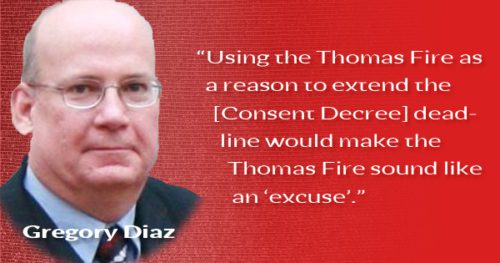




 Ventura Water forces the City Council to get their information from the General Manager. Thus bypassing the entire reason the city established the Water Commission.
Ventura Water forces the City Council to get their information from the General Manager. Thus bypassing the entire reason the city established the Water Commission. You may not have heard about the incident. It’s not because Ventura Water didn’t announce it. They did. Ventura Water fulfilled the letter of the law, but it may have missed the intent behind it. Meeting the legal requirement seems to be the minimum standard. Yet setting the bar at the lowest level may place everyone’s health at risk in the future.
You may not have heard about the incident. It’s not because Ventura Water didn’t announce it. They did. Ventura Water fulfilled the letter of the law, but it may have missed the intent behind it. Meeting the legal requirement seems to be the minimum standard. Yet setting the bar at the lowest level may place everyone’s health at risk in the future. In July, Ventura Water withheld information from the Water Commission. A panel of experts examined
In July, Ventura Water withheld information from the Water Commission. A panel of experts examined 



 City Manager
City Manager Water Department’s New General Manager
Water Department’s New General Manager